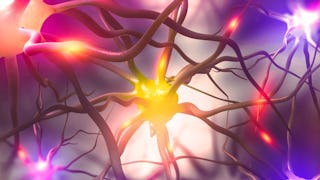- Browse
- Neural Networks
Results for "neural networks"
 Status: Free TrialFree TrialL
Status: Free TrialFree TrialLLearnQuest
Skills you'll gain: Software-Defined Networking, Network Security, Infrastructure Security, Computer Networking, Local Area Networks, Network Architecture, Network Infrastructure, Wide Area Networks, Virtualization, Scalability
Beginner · Course · 1 - 4 Weeks
 Status: PreviewPreviewG
Status: PreviewPreviewGGoogle Cloud
Skills you'll gain: Performance Tuning, Artificial Intelligence and Machine Learning (AI/ML), Artificial Neural Networks, Applied Machine Learning, Deep Learning, Natural Language Processing, Text Mining
Intermediate · Course · 1 - 4 Weeks
 Status: Free TrialFree TrialU
Status: Free TrialFree TrialUUniversity of Colorado Boulder
Skills you'll gain: Mathematical Modeling, Software Systems, Mechanical Engineering, Systems Analysis, Systems Engineering, Applied Mathematics, Differential Equations, Hardware Architecture, Verification And Validation, Linear Algebra
Build toward a degree
3.4·Rating, 3.4 out of 5 stars18 reviewsIntermediate · Course · 1 - 4 Weeks
 Status: Free TrialFree TrialD
Status: Free TrialFree TrialDDartmouth College
Skills you'll gain: Neurology, Anatomy, Mindfulness, Physiology, Human Learning, Biology, Psychology, Experimentation, Mental Health Diseases and Disorders
4.5·Rating, 4.5 out of 5 stars8 reviewsMixed · Course · 1 - 4 Weeks
 Status: PreviewPreviewG
Status: PreviewPreviewGGoogle Cloud
Skills you'll gain: Machine Learning Methods, Deep Learning, Applied Machine Learning, Artificial Neural Networks, Text Mining, Natural Language Processing
Intermediate · Course · 1 - 4 Weeks
 Status: NewNewStatus: Free TrialFree Trial
Status: NewNewStatus: Free TrialFree TrialSkills you'll gain: Computer Security Incident Management, Vulnerability Assessments, Cybersecurity, Cyber Threat Intelligence, Cyber Attacks, Security Management, Cyber Threat Hunting, Information Systems Security, Threat Detection, Data Security, Network Security, Application Security, Cyber Security Strategy, DevSecOps, Malware Protection, Cloud Security, Cyber Security Assessment, Risk Management Framework, Encryption, Authentications
4.5·Rating, 4.5 out of 5 stars11 reviewsIntermediate · Specialization · 1 - 3 Months
 Status: NewNewStatus: Free TrialFree TrialU
Status: NewNewStatus: Free TrialFree TrialUUniversity of Colorado Boulder
Skills you'll gain: Multimodal Prompts, Linear Algebra
Build toward a degree
Advanced · Course · 1 - 4 Weeks
 Status: Free TrialFree Trial
Status: Free TrialFree TrialSkills you'll gain: Distributed Denial-Of-Service (DDoS) Attacks, Azure Active Directory, Microsoft Azure, Cloud Security, Firewall, Cyber Attacks, Cybersecurity, Malware Protection, Identity and Access Management, Network Security, Threat Management, Endpoint Security, Security Information and Event Management (SIEM), Threat Detection, Scenario Testing, Virtual Machines, Encryption, Event Management
Beginner · Course · 1 - 4 Weeks
 Status: NewNewStatus: Free TrialFree TrialM
Status: NewNewStatus: Free TrialFree TrialMMacquarie University
Skills you'll gain: Mobile Security, Investigation, Mobile Development, Apple iOS, Criminal Investigation and Forensics, Android (Operating System), Application Security, Legal Proceedings, Cybersecurity, File Systems, Malware Protection, Computer Security, Secure Coding, Computer Security Incident Management, Cloud Security, Security Strategy, Analysis, Encryption, Debugging, Disaster Recovery
4.5·Rating, 4.5 out of 5 stars10 reviewsBeginner · Course · 1 - 3 Months
 Status: Free TrialFree Trial
Status: Free TrialFree TrialSkills you'll gain: Identity and Access Management, Authentications, AWS Identity and Access Management (IAM), User Provisioning, OAuth, User Accounts, Security Controls, Role-Based Access Control (RBAC), Authorization (Computing), Single Sign-On (SSO), Cryptographic Protocols
4.7·Rating, 4.7 out of 5 stars20 reviewsIntermediate · Course · 1 - 4 Weeks
 A
AAlfaisal University | KLD
Skills you'll gain: Interpersonal Communications, Self-Awareness, Social Skills, Rapport Building, Active Listening, Emotional Intelligence, Communication, Personal Development
4.7·Rating, 4.7 out of 5 stars58 reviewsBeginner · Course · 1 - 4 Weeks
 C
CCoursera
Skills you'll gain: Cryptography, Encryption, Public Key Cryptography Standards (PKCS), Python Programming, Data Security
4.8·Rating, 4.8 out of 5 stars12 reviewsIntermediate · Guided Project · Less Than 2 Hours
Searches related to neural networks
In summary, here are 10 of our most popular neural networks courses
- Introduction to Software-Defined (SD) Branch: LearnQuest
- Attention Mechanism - Português Brasileiro: Google Cloud
- Modeling of Autonomous Systems: University of Colorado Boulder
- Free Will and Neuroscience: Dartmouth College
- Attention Mechanism - בעברית: Google Cloud
- CompTIA Cybersecurity Analyst (CySA+) CS0-003: Pearson
- Modern AI Models for Vision and Multimodal Understanding: University of Colorado Boulder
- Azure Cybersecurity Solutions And Microsoft Defender : Microsoft
- Cyber Security: Mobile Security: Macquarie University
- Identity and Access Management (IAM): Packt










